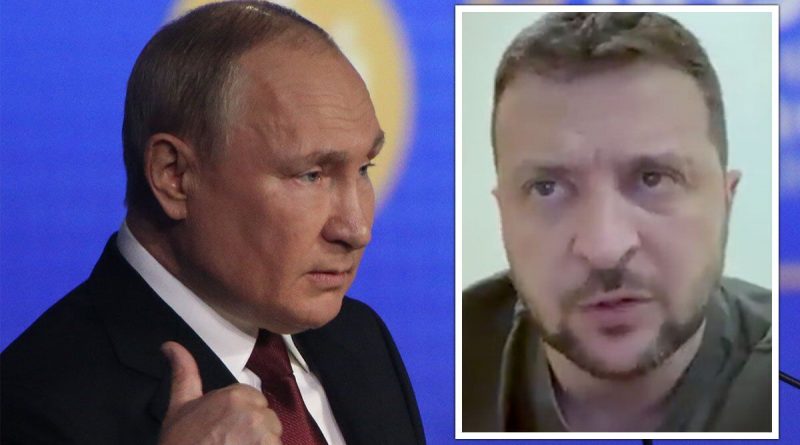‘Historic week’ Russia to launch ‘greater hostile activity’ as Ukraine gets EU update
Ukraine: Dog treated by Ukrainian soldiers after shrapnel wound
We use your sign-up to provide content in ways you’ve consented to and to improve our understanding of you. This may include adverts from us and 3rd parties based on our understanding. You can unsubscribe at any time. More info
Vladimir Putin’s Russia will intensify “offensive forces” and “artillery attacks” against Ukraine and potentially other European Union member states in response to the European Commission officially granting Ukraine the status of candidate for EU membership, President Volodymyr Zelensky said. Last Friday, European Commission President Ursula Von der Leyen recommended giving Ukraine the long-sought status. Ukrainian President Volodymyr Zelensky hailed the move on Twitter, saying: “It’s the 1st step on EU membership path that’ll certainly bring our Victory closer.”
However, as the European Union is set to officially grant the candidate status at the upcoming EU summit, President Zelensky warns, Vladimir Putin will beef up its military response in and outside Ukraine.
In Sunday’s nightly address, President Zelensky said: “Tomorrow a truly historic week begins. A week when we will hear the answer from the European Union on the candidate status for Ukraine. We already have a positive decision from the European Commission, and at the end of the next week, there will be a response from the European Council.
“I think it’s obvious to everyone that since 1991, there have been few such fateful decisions for Ukraine as we expect now. And I am convinced that only a positive decision meets the interests of the whole of Europe.”
Ukraine came close to concluding an association agreement with the EU in November 2014, but then Prime Minister Yanukovich chose instead to establish closer ties with the Russian federation.


That decision prompted the Euromaidan protests, with pro-EU Ukrainians taking to the streets in favour of joining the EU.
In the predominantly Russian-speaking east, however, a large part of the population opposed the Euromaidan protests and instead supported the Yanukovich government.
Violence and civil unrest escalated into the Donbas war, which in February of this year, Putin failed to expand to the whole of Ukraine.
Now with an EU candidate status, President Zelensky appears a step closer to a formal EU membership.


He continued: “I will deliver new addresses this week, including to Europeans. I will take every opportunity to defend the European perspective for Ukraine, for each of us, and to gather new supporters for us.
“Obviously, we should expect greater hostile activity from Russia. Purposively – demonstratively. This week exactly. And not only against Ukraine, but also against other European countries. We are preparing. We are ready.
“We warn partners”, President Zelensky said. “The occupiers are accumulating forces in the Kharkiv region, in the Zaporizhia region. They struck at our fuel infrastructure again – they want to worsen the fuel situation. Of course, we will respond to this, too.
“Fierce fighting continues in Donbas. The Russian army uses the greatest number of artillery, there, the greatest number of offensive forces.
DON’T MISS:
Putin’s war escalates as British Armed Forces told: ‘Be ready’ [REPORT]
China blasts Russia for being ‘too flashy’ in military drill [REPORT]
Putin’s war could last for years, warns Nato chief [REPORT]

“But Severodonetsk, Lysychansk, Avdiivka, Krasnohorivka and other hot spots are holding on. Our people are like that.”
The key city of Severodonetsk has become the epicentre of the war, as military observers and President Zelensky argue it could determine which way the war could take. Russian forces have so far managed to seize the neighbouring town of Metelkine.
A Donbas official said: “(They) want to make a breakthrough there, and for this purpose they have gathered a large amount of equipment there.
Fighting is taking place in many villages around Severodonetsk and Lysychansk.”
Source: Read Full Article




